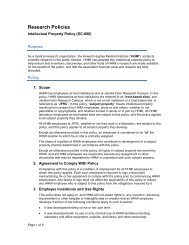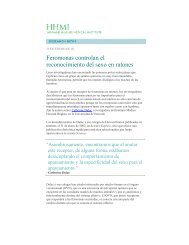Writing a Letter of Recommendation - Howard Hughes Medical ...
Writing a Letter of Recommendation - Howard Hughes Medical ...
Writing a Letter of Recommendation - Howard Hughes Medical ...
You also want an ePaper? Increase the reach of your titles
YUMPU automatically turns print PDFs into web optimized ePapers that Google loves.
<strong>Writing</strong> a <strong>Letter</strong> <strong>of</strong> <strong>Recommendation</strong><br />
♦ For people who are not in your lab—ask for a current CV that includes<br />
the dates and locations <strong>of</strong> their training and a list <strong>of</strong> publications as well<br />
as copies <strong>of</strong> any papers that are in press or that have been submitted.<br />
♦ For people who were in your lab but have since moved on—ask for a<br />
written summary <strong>of</strong> their current work, future plans, and why they are<br />
interested in the position for which you are writing the letter.<br />
♦ For students who are not in your lab or department but who were in one<br />
<strong>of</strong> the classes you taught—ask for transcripts and check your class records.<br />
Many reference writers find it helpful to meet with the person who has requested<br />
the letter <strong>of</strong> recommendation. In such a meeting you can learn about the person’s<br />
long-term career goals and how his or her current research and other activities relate<br />
to these goals. Ask about the programs<br />
or positions for which letters are being<br />
Tip: Don’t ask the candidate to write a draft <strong>of</strong><br />
the letter for you. Most heads <strong>of</strong> labs say this rarely<br />
saves time and sometimes leads to a weaker letter.<br />
It is better for the candidate to provide you with<br />
all the necessary information, from which you can<br />
then pick and choose as you write your letter.<br />
requested and what the individual’s preference<br />
is and why. You should also discuss<br />
the candidate’s strengths and weaknesses<br />
as they relate to these positions.<br />
If you cannot have a face-to-face meeting,<br />
ask the candidate for a detailed written<br />
description <strong>of</strong> these issues.<br />
Allot Sufficient Time to Write and Send the <strong>Letter</strong><br />
Once you have gathered the data and marked the deadline on your calendar,<br />
make sure you set aside enough time to write the letter. It can take one to two<br />
hours, sometimes longer, to craft a well-written letter for one individual. (It takes<br />
less time to tweak this initial letter for different programs or positions the same<br />
individual has applied to.)<br />
The candidate should give you clear instructions on how and where to send the<br />
letter. Some letters have to be submitted online, some e-mailed, and others sent<br />
by snail mail.<br />
WHAT THE LETTER SHOULD SAY<br />
Keep the following pointers in mind when you craft your letter.<br />
Introduce Yourself and the Candidate<br />
Begin the letter by describing how you know the candidate. Briefly state your<br />
own qualifications so that people who don’t know you can decide whether to<br />
BWF ♦ HHMI 3
















